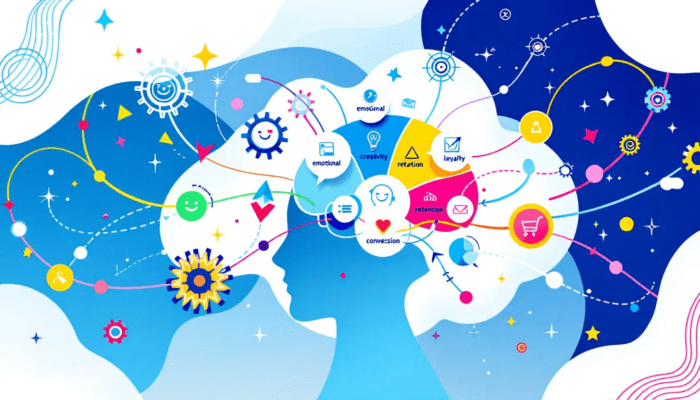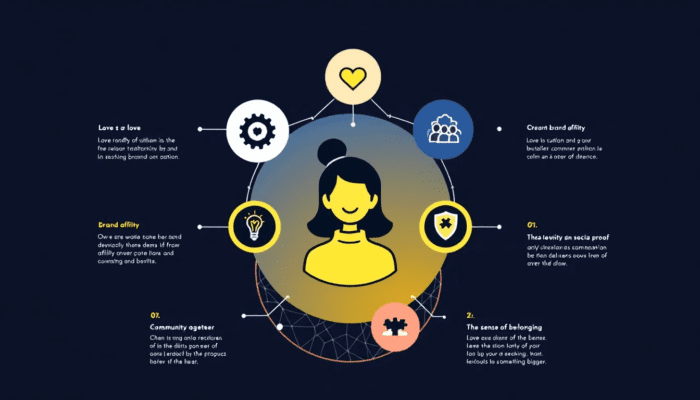Brand affinity is the emotional bond between a brand and its customers. Why is this important? Strong brand affinity leads to loyalty, repeat business, and brand advocacy. Read on to discover strategies to build and measure this connection.
Key Takeaways
- Brand affinity is essential for creating lasting emotional connections, leading to increased loyalty and engagement.
- Investing in brand affinity results in tangible benefits, including enhanced customer loyalty, premium pricing power, and reduced marketing costs.
- Understanding your audience, effectively communicating brand values, and delivering exceptional customer experiences are key strategies for building brand affinity.
What is Brand Affinity?

Brand affinity is the emotional connection between customers and a brand, rooted in shared values and positive experiences. Unlike brand awareness, which is about recognition and recall, brand affinity dives deeper into loyalty and emotional bonds. When customers resonate with your brand’s values, mission, or story, they form a lasting connection that goes beyond mere transactions.
Think of brand affinity as a relationship built on trust and mutual understanding. It’s not just about knowing a brand exists; it’s about feeling a part of its journey. This emotional connection fosters trust, loyalty, and engagement, which are critical for a brand’s success. Improving products and services, addressing core customer interests, and maintaining satisfaction are pivotal in building this affinity.
Storytelling plays a crucial role in this process. Brands that communicate their values and missions through relatable stories engage their audience emotionally. This makes the brand more relatable and helps in building stronger connections. For instance, a deep connection to a sustainable clothing brand due to shared values about environmental responsibility exemplifies strong brand affinity.
Why Brand Affinity Matters

In an era where consumers seek brands that align with their values, brand affinity has never been more critical. Building brand affinity significantly increases lifetime value as customers develop long-term loyalty to the brand. Such loyalty results in repeat purchases, recommendations, and brand advocacy, which are invaluable for sustained business growth.
Strong affinity gives a brand a sustainable competitive advantage, setting it apart in a saturated market. Customers who feel a genuine connection with a brand are likelier to stay loyal, even when competitors offer. This bond enhances retention rates and fosters loyal relationships, ultimately contributing to the brand’s success.
Customers are willing to go the extra mile for your brand, not for discounts or promotions, but because they believe in your values and exemplify strong brand affinity. This is the power of brand affinity. It transforms customers into passionate advocates who sing your praises and defend your brand against criticism. Such loyalty is priceless and can significantly boost your brand’s reputation and equity.
Key Benefits of Building Brand Affinity

Building brand affinity is not just a feel-good strategy; it brings tangible benefits that can propel your brand to new heights. The advantages range from enhanced customer loyalty and premium pricing power to reduced marketing costs.
Let’s delve deeper into these critical benefits to understand why investing in brand affinity is a game-changer.
Enhanced Customer Loyalty
Emotional connections with customers lead to increased loyalty and repeat purchases. Customers with a deep bond to a brand are more likely to stay loyal even when alternatives are available. This loyalty translates to a more stable revenue stream and higher customer lifetime value.
Brands that cultivate strong emotional connections can count on a loyal customer base that supports them through thick and thin.
Emotional connections with customers encourage long-term loyalty and advocacy. Satisfied customers who feel valued often become passionate brand advocates. These advocates make repeat purchases and recommend the brand to others, amplifying its reach and reputation. Word-of-mouth promotion is one of the most effective and cost-efficient ways to grow your customer base.
Consistent positive experiences are crucial for fostering loyalty. Positive interactions at every touchpoint help develop a robust and hard-to-break customer relationship. This relationship is built on trust, satisfaction, and a sense of belonging, all contributing to enhanced customer loyalty.
Premium Pricing Power
One remarkable benefit of solid brand affinity is the ability to command premium pricing. Customers with a significant emotional connection to a brand are often willing to pay more for its products or services. This perceived value stems from their trust and connection, which justifies the higher price in their minds, enhancing brand equity.
Consumers are more comfortable paying a premium for brands they trust and feel connected to. This premium pricing power enhances profitability and reinforces the brand’s positioning in the market. Brands with strong emotional bonds can differentiate themselves from competitors, making price a secondary consideration for loyal customers.
Reduced Marketing Costs
Brand affinity can lead to reduced marketing costs through organic promotion by loyal customers. Consumers with strong connections to a brand often become passionate advocates, promoting the brand through word-of-mouth and social media.
These advocates engage with the brand by sharing positive experiences and communicating its value to others.
Personal recommendations through brand advocacy expand the customer base and enhance marketing efficiency. Brand advocates can significantly lower marketing expenses by generating organic referrals. This organic growth reduces the need for extensive marketing efforts and reinforces the brand’s reputation and credibility.
Strategies to Build Brand Affinity

Building brand affinity requires a strategic approach focusing on understanding your audience, defining and communicating brand values, and delivering exceptional customer experiences.
Let’s explore these strategies to understand how they contribute to building strong brand affinity.
Understand Your Target Audience
Understanding your target audience is the first step to building brand affinity. Researching your customers’ values and preferences is vital for forming meaningful connections. Surveys, social media engagement, and customer feedback are methods to understand your audience. These methods offer insights into what your customers value and how they perceive your brand.
User-generated content analysis can reveal insights about customer interactions with your brand. Observing customers on social media offers valuable information about their sentiments and engagement levels. Tools like Sprout Social, Brand24, and Hootsuite can aid in this research, helping you gain a deeper understanding of your audience.
Successful brands shape their brand strategy through exemplary practices. Businesses should provide memorable, positive experiences at every touchpoint to exceed customer expectations. This approach fosters loyalty and enhances the brand's and its customers' emotional connection.
Define and Communicate Brand Values
Defining and communicating brand values is crucial for building brand affinity. Aligning your brand’s actions with audience values fosters a deeper emotional investment in your brand. Non-transactional messages and a clear brand voice effectively communicate these values.
Examples include Lush Cosmetics, which engages eco-conscious consumers through stories focused on sustainability and ethical practices, and TOMS Shoes, which has fostered affinity by integrating social responsibility into its brand identity.
Deliver Exceptional Customer Experiences
Delivering exceptional customer experiences fosters emotional connections and encourages brand loyalty. Going beyond customer expectations at every interaction can create lasting brand advocates. Excellent customer service leads to customer satisfaction and transforms customers into advocates who promote your brand.
Today, 54% of customers expect better service than a year ago. Meeting and exceeding these expectations is essential for building strong customer relationships and enhancing brand affinity.
Measuring Brand Affinity
Measuring brand affinity is crucial for understanding how well your strategies are working. Net Promoter Score (NPS), social media engagement, and customer feedback and surveys are common methods. These metrics assess customer satisfaction and the depth of customer relationships and measure brand affinity with the audience.
Net Promoter Score (NPS)
NPS measures how likely customers are to recommend a brand. It serves as an indicator of customer loyalty. This metric is key to assessing customer loyalty and their likelihood to promote your brand. NPS results indicate the strength of emotional connections between customers and the brand, reflecting brand affinity.
A high NPS score signifies strong brand affinity, showing that customers are willing to endorse your brand to others. This endorsement is a powerful indicator of customer loyalty and satisfaction, providing valuable insights into your brand’s performance.
Social Media Engagement
Analyzing brand mentions on social media provides insights into public perception of the brand. Monitoring social media engagement gives brands insights into customer perceptions and opportunities for improvement. Brand mentions helping understand public perception and guide marketing strategies and communication adjustments.
Effective social media engagement strategies contribute to positive brand perceptions and enhance customer loyalty. By engaging with customers on social platforms, brands can foster stronger emotional connections and build a loyal community.
Customer Feedback and Surveys
Customer feedback is essential for understanding satisfaction, preferences, and areas for improvement. Feedback can be gathered through email, social media, and direct communication. Incentives like freebies or discounts can encourage participation in surveys.
Modern Citizen’s extensive annual survey, with about 40 or 50 questions, is an example of an effective feedback strategy to gather customer sentiment. The goal is to understand each customer’s relationship with the brand, strengthening customer relationships and enhancing customer engagement.
Collecting feedback is essential. Analyzing and acting on it helps build stronger customer relationships.
The Role of Content Marketing in Brand Affinity

Content marketing builds emotional connections through thought leadership and industry expertise. Sharing content that reflects brand personality and values helps form connections with customers. Content tapping into shared interests or values encourages deeper brand engagement.
Brands demonstrate their values through actions like sustainability, charitable contributions, and social advocacy. An example is Patagonia, which has established a loyal customer base by positioning itself as a leader in environmental sustainability. The time customers spend engaged with content indicates their interest level and emotional connection to the brand.
Delivering valuable thought leadership content is an investment in building brand affinity. This content educates, informs, and resonates with the audience, fostering deeper connections and loyalty.
Building a Strong Customer Community
Aligning brand values with customer values encourages a sense of community. A strong customer community gives individuals a sense of worth and belonging. Encouraging social media comment engagement increases customer interaction and strengthens community ties.
A platform for customer interaction enhances brand affinity and encourages member sharing. Active social media engagement allows brands to cultivate a community that fosters customer loyalty. This sense of community can turn customers into passionate brand advocates.
Case Studies: Brands with High Affinity
Apple built a strong emotional bond with customers through innovative product launches and a focus on customer service. This bond transformed Apple customers into passionate advocates who were willing to stand in long lines for the latest product release.
Netflix gained customer loyalty by consistently delivering on its promise of convenience and personalized content. Tesla owners are known for enthusiastic advocacy, reflecting the brand’s strong emotional connection with consumers.
Salesforce built brand affinity by creating IdeaExchange, an interactive community for customer feedback. This community allowed customers to pitch, debate, and upvote features, guiding Salesforce’s product development and leading to significant enhancements.
Summary
Building brand affinity is a strategic investment that pays off through enhanced customer loyalty, premium pricing power, and reduced marketing costs. Understanding your target audience, defining and communicating your brand values, and delivering exceptional customer experiences can create deep emotional connections that transform casual customers into passionate brand advocates.
As you measure and refine your strategies, remember that brand affinity is not built overnight. It requires consistent effort, genuine engagement, and a commitment to exceeding customer expectations. The thriving brands make customers feel valued, understood, and part of a larger community. Embrace these principles, and watch your brand’s loyalty and reputation soar.

Frequently Asked Questions
What is the difference between brand affinity and brand awareness?
Brand affinity is about the emotional bond and loyalty customers feel towards a brand, while brand awareness focuses on how well customers recognize and remember that brand. Cultivating brand affinity can lead to deeper customer loyalty and advocacy!
Why is brand affinity important for my business?
Brand affinity is crucial for your business as it boosts customer loyalty, increases lifetime value, and gives you a competitive edge. Building solid relationships with customers ensures they become advocates for your brand, driving long-term success!
How can I measure brand affinity?
To effectively measure brand affinity, utilize the Net Promoter Score (NPS), analyze social media engagement, and gather customer feedback through surveys. These techniques will provide valuable insights into your audience's feelings about your brand!
What are some examples of brands with high brand affinity?
Brands like Apple, Netflix, Tesla, and Salesforce exemplify high brand affinity by creating deep emotional connections with their customers through innovation and personalized experiences. Building such relationships can significantly enhance your brand's loyalty and success!
How does content marketing help build brand affinity?
Content marketing builds brand affinity by creating emotional connections through content that reflects your brand's personality and values. It fosters engagement with customers over shared interests. You strengthen the bond between your brand and its audience by showcasing your commitment to important issues, like sustainability.

About the author
Mark A. Hope is the co-founder and Partner at Asymmetric Marketing, an innovative agency dedicated to creating high-performance sales and marketing systems, campaigns, processes, and strategies tailored for small businesses. With extensive experience spanning various industries, Asymmetric Marketing excels in delivering customized solutions that drive growth and success. If you’re looking to implement the strategies discussed in this article or need expert guidance on enhancing your marketing efforts, Mark is here to help. Contact him at 608-410-4450 or via email at mark.hope@asymmetric.pro.

